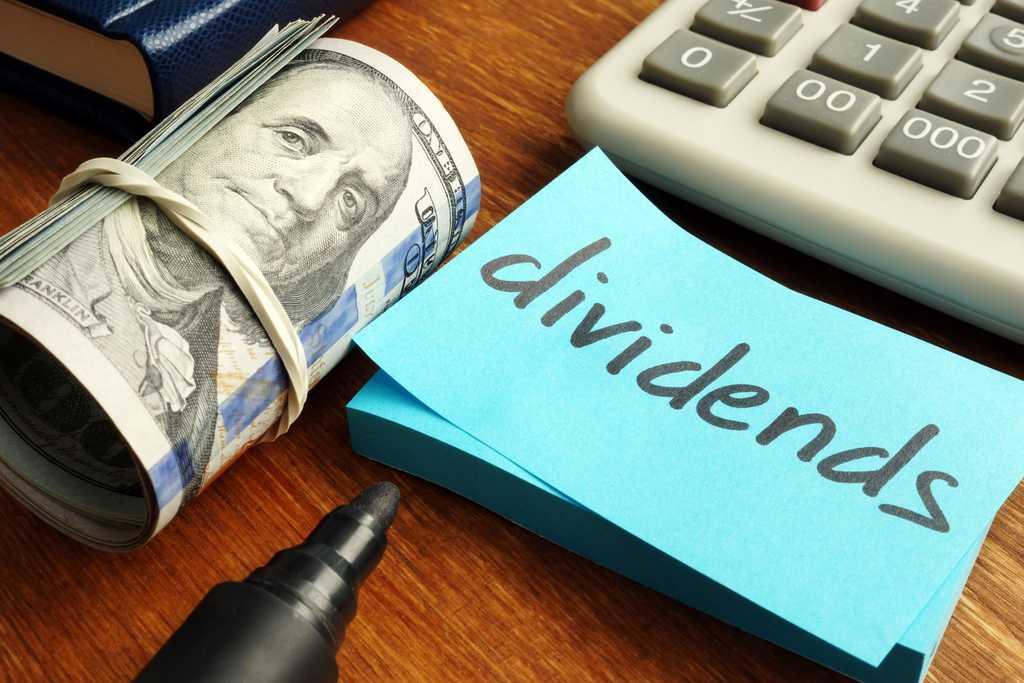When it comes to investing, learning what dividends are is important because it helps you understand how you get a return on your investment.
What is a dividend?
A dividend is when a company distributes its profits to their shareholders. Dividends are paid out to these investors from corporate earnings, and shareholders can choose to reinvest their share of the profits. Depending on how the shareholder receives their dividends (for example, into a taxable brokerage account versus a tax-advantaged IRA account), the earnings may be taxable.
A company raises funds from shareholders to grow and maintain its business, which makes shareholders small owners of the business. Therefore, when a company makes a profit, it can return that money to its owners (the shareholders) in the form of a dividend.
How do stock dividends work?
Dividends are paid per share of stock a shareholder owns. For instance, if the company decides to pay $5 per share of stock and you have 200 shares, you’ll be paid $1,000. The most common kind of dividend is paid to shareholders in cash, though companies can also pay dividends as additional shares of stock or warrants to purchase stock.
While both private and public companies can pay dividends, not all will offer them.
Typically, companies in the following industries pay out dividends:
- Oil and gas
- Raw materials
- Financial sector
- Healthcare and pharmaceutical companies
In addition, companies choose when to pay out dividends, either monthly, quarterly or annually. Moreover, companies usually don’t pay out all their net profits to shareholders in order to keep some retained earnings to grow and invest in the business.
In some cases, companies may choose to pay dividends even if it doesn’t earn a healthy profit (or at all). That’s because these companies may want to maintain their reputation for paying out dividends regularly to encourage more shareholders to invest with them.
Although most dividends are paid out regularly, there may be special dividends that are paid out irregularly. These are usually a one-off bonus payment, sometimes from companies who may not normally offer dividends at all.
Companies pay out special dividends because they want to share extra earnings to shareholders during extremely profitable periods. There is no guarantee shareholders will receive extra earnings during high profitability, nor is there a promise these will be regular payments.
Types of dividends
There are two main types of dividends: ones from common stock and preferred stock.
- Common stock: Everyday investors typically hold common stock if they invest in individual stocks. Shareholders will have voting rights but aren’t always guaranteed regular dividend payments.
- Preferred stock: While shareholders of preferred stock have limited or no voting rights, they have more of a claim to dividends and are more likely to receive them at a certain rate of return. Think of them as similar to how investors invest their money in bonds. Preferred stock also might not offer as much growth as common stock.
Neither type of dividend is better than the other. Before investing with either, keep in mind that preferred stock may not offer a higher rate of return, but shareholders tend to receive payments before common stockholders if a company ends up going bankrupt.
Dividend pros and cons
It’s important to think through the advantages and disadvantages of dividends before making any investment decision.
Pros
- You earn investment returns: Being a shareholder gives you the opportunity to earn money from companies, potentially more if they pay out special dividends on occasion.
- Dividends may provide a steady source of income: Regular dividends from a company that has a record of reliable payments can be a source of income in retirement.
- Some tax benefits: Depending on the type of dividends you receive, from your stocks, the IRS may tax your earnings at a lower long-term capital gains rate. If you keep your investments in tax advantaged accounts, you won't pay taxes until you withdraw them, helping you generate higher returns for the foreseeable future.
Cons
- Most dividends are (generally) taxed as regular income: Unless your dividend paying investments are in a tax-advantaged retirement account, like an IRA or 401(k), they are counted as regular income and you will pay taxes on them according to your income tax bracket.
- Dividends aren’t guaranteed: Compared to bonds and other types of fixed assets, stock dividends are more volatile, which may not be the best choice if you're a conservative investor.
How to calculate dividend yield
Dividend yield measures how much a company pays in dividends relative to its share price. In other words, dividend yield measures the return on your investment for a stock without accounting for capital gains. Investors use the dividend yield to gauge whether it makes sense for them to invest in a particular stock for income (rather than growth) purposes.
Expressed as a percentage, the dividend yield is calculated by the value of dividends paid per share by the value of a share of stock at a certain period in time. If you want to estimate the yield for a current year, take the previous year’s annual dividend or multiply the most current quarterly dividend by four. Then, use this number to divide it by the share price.
For example, Annette’s Manufacturing’s stock pays annual dividends of $2 per share and is currently valued at $40 per share. Anytown Finance on the other hand, trades for $60 and pays $2.50 in annual dividends.
Looking at both stocks, Annette’s Manufacturing has a dividend yield of 5% while Anytown Finance is 4.1%. This means that you’re more likely to generate higher cash returns with Annette’s Manufacturing.
That said, there are other factors to consider when selecting stocks to invest in. It’s a smart idea to consult a finance professional before making any investments.
How are dividends taxed?
Dividends are taxed differently and depend on whether you have qualified or nonqualified (ordinary) dividends.
Qualified dividends tend to be taxed at the long term capital gains rate — which is lower— compared to ordinary dividends which are taxed at the regular income tax rate. To qualify for the lower tax rate, you need to have dividends paid by a U.S company or equivalent, and the stock needs to be in your possession for a minimum period of time.

